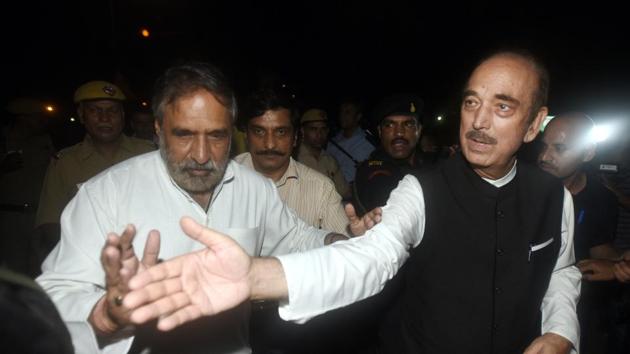Doklam border standoff: Govt’s briefing to Opposition parties in 5 points
The importance of India and China to remain engaged through diplomacy was underlined at a briefing by senior Union ministers to political parties on the situation in Dokalam.
The government reached out to the opposition parties and some of its allies on Friday to build a consensus on the border standoff with China ahead of Parliament’s monsoon session, but faced tough questions on the delay in resolving the dispute.

In response to the opposition leaders’ call for using “active diplomatic channels”, the Centre said it is engaged in negotiations to ease the tension in the Doklam region of the Sikkim sector.
Here are five highlights from the meeting:
1) The briefing was jointly held by home minister Rajnath Singh, external affairs minister Sushma Swaraj and defence minister Arun Jaitley and was attended by leaders of various political parties.
“All participants expressed strong support for India’s approach and also for the need for national unity. Importance of India and China to remain engaged through diplomacy was underlined,” MEA spokesperson Gopal Baglay said.
The briefing was also attended by National Security Adviser Ajit Doval and Foreign Secretary S Jaishankar.
2) Jaishankar was quoted by opposition members as saying that China is trying to change the status quo along its southern border.
He talked about the diplomatic process to resolve one of the longest border standoff in recent times.
Opposition leaders, including Congress’ Anand Sharma and CPM general secretary Sitaram Yechury, wanted to know why the impasse happened in 2017 and why the government is unable to find a solution through negotiations and discussions. Most leaders, including the NCP’s Sharad Pawar, seconded the questions.
“What triggered the standoff?” Sharma asked.
3) The Congress, Trinamool Congress, CPM and Shiv Sena, which is an NDA ally, fielded a flurry of questions. Some of the opposition leaders later said they didn’t get satisfactory answers.
“We said that on issues of national security and integrity of the country, we are with the government,” Trinamool leader Derek O’Brien said.
Jaishankar informed the leaders about the strategic significance of Doklam and said the faceoff needs to be seen in the context of the Siliguri corridor, the narrow stretch of land connecting the Northeast with the country.
“There was widespread appreciation of the understanding between India and China that differences between them shouldn’t become disputes,” Baglay said.
4) The Shiv Sena took an aggressive stand and sought action and “not mere talks” from the Centre.
But AIADMK parliamentarian A Navaneethakrishnan said they are satisfied with the government’s response.
Former defence minister Mulayam Singh Yadav, who represented the Samajwadi Party at the meeting, said the government needs to be careful about dealing with China.
Defence minister Arun Jaitley, home minister Singh and foreign minister Sushma Swaraj along with national security adviser Ajit Doval were present at the meeting.
It was decided that Mulayam Singh and Pawar, two former defence ministers, would meet Jaitley on the China issue. Swaraj called another meeting on Saturday to brief other party leaders.
5) The government also briefed the leaders on the attack in Jammu and Kashmir’s Anantnag in which seven Amarnath pilgrims were shot dead by militants when they returning from the shrine.
Several leaders said the government couldn’t come up with a credible reason to explain security lapses that led to the attack.
“Why was there a lapse and security failure?” asked O’Brien.
The leader of the opposition in the Rajya Sabha, Ghulam Nabi Azad of the Congress, wanted to know why the bus took four hours for a two-hour journey and why it was allowed to travel at night.





